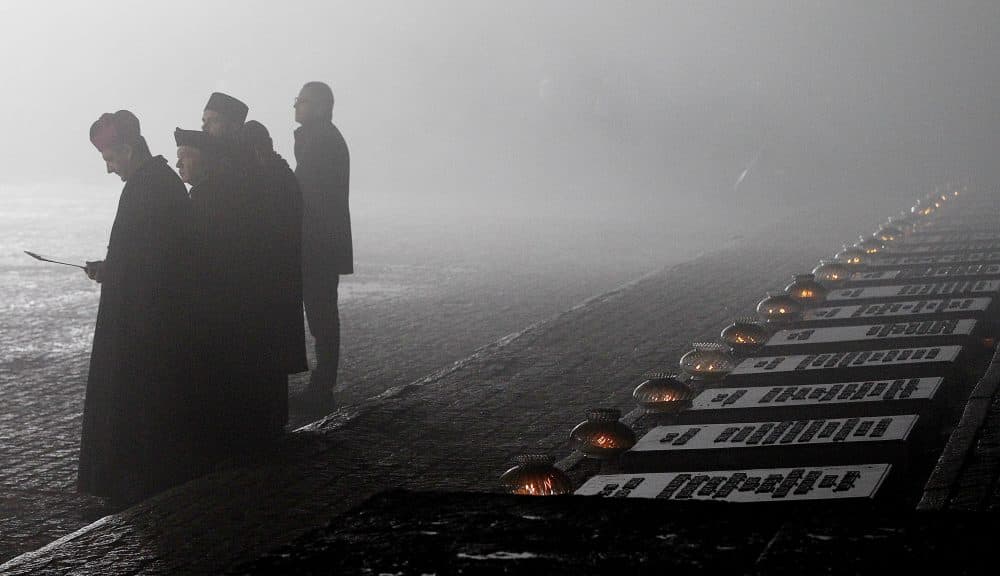Advertisement
Why Poland's 'Death Camp' Law Should Have All Of Us Worried

Poland's president signed legislation Tuesday meant to combat claims that Poles colluded with the Nazis during World War II. The legislation singles out the phrase “Polish Death Camps” for particular scrutiny; anyone using it would face imprisonment.
The bill’s originators argue that it is necessary for protecting and disseminating historical truth: The Poles were victims rather than perpetrators of the Holocaust; many of them, at great personal risk, saved Jews. Upon learning of this bill, the Israeli government protested vigorously. Prime Minister Benjamin Netanyahu and others described it as an attempt to “rewrite” history and whitewash the crimes of those who either assisted Nazis or stood by as Jews were burned at Auschwitz and other camps.
On the historical record, both governments are correct. Many Poles saved Jews (in fact, Yad Vashem, the Israeli Holocaust Museum, recognizes more Poles than members of any other nationality as “righteous among the nations” — gentiles who helped rescue Jews). Furthermore, many Poles fought bravely against the Nazis as partisans. And, at the same time, scores of others assisted the Nazis enthusiastically and many, many more looked away either from fear or in tacit approval as the Germans went about implementing the “Final Solution.”
But the problem is not whether the bill accurately reflects what happened in Poland during the war. The problem is that history cannot and should not be adjudicated by the criminal courts. Historical truth is multilayered and complicated. Poles were both heroes and villains when it came to their attitudes and deeds toward the Jews. Sometimes the same people were both. That kind of complexity has to be discussed, debated and studied in secondary school classrooms, universities, public forums and the popular press.
Laws are not instruments for settling historical debates.
The Polish government is not “protecting the truth” with its new law, because the truth is far too complicated to protect by means of the criminal justice system. It is, rather, trying to do what authoritarian-leaning regimes always try to do: use the legal system as an instrument for bolstering its own image, promote a sense of national greatness and stir nationalist sentiment. The obligation of democracies is not to make sure that the law promotes an accurate version of history but to insist that law has no place in the shaping of historical narrative in the first place.
Laws are not instruments for settling historical debates. They are tools for regulating our lives in a way that allows for free discussion, free inquiry and for individuals to chart their own course. This is the classical conception of liberal democracy put forward by thinkers like John Stuart Mill, and it is still worth articulating and defending today. The Polish bill is wrong not because of what it says about the Holocaust but because of what it says about the state of Polish democracy. Whatever it gets right about the moral responsibility of Poles during World War II, the recent bill shows us that the Polish government gets just about everything wrong about what law is supposed to do in a democratic polity. That is the only appropriate grounds on which to criticize it.

Incidentally, it’s no wonder that the Israeli government fails to appreciate this point. In the past few years, Netanyahu’s own government has supported a series of similarly oriented bills meant to cement the Israeli right’s sense of national identity and its version of political history. These proposals, sometimes referred to collectively as “loyalty-citizenship laws,” have included a rephrasing of the loyalty oath required of naturalized citizens to include terms demeaning to the state’s Palestinian citizens. It's a “loyalty in culture” bill that would allow the minister of culture to limit funding for cultural initiatives or organizations that reject the idea of Israel as a Jewish Democratic state, and a bill giving the minister of treasury the authority to revoke funding from organizations that mark Israeli independence in 1948 as Nakbah or “catastrophe” — the Palestinian phrase for the creation of Israel.
The Israelis would do well to remember that their boast of being “the only democracy in the Middle East” comes with the obligation of actually behaving like one. And the European Union should forcefully remind Poland of the expectations it has from its democratic members. Being offended at how someone views your history or cultural legacy justifies arguing with them, instructing them, maybe even offending them in turn. But democracies do not and cannot make criminals of their critics.
